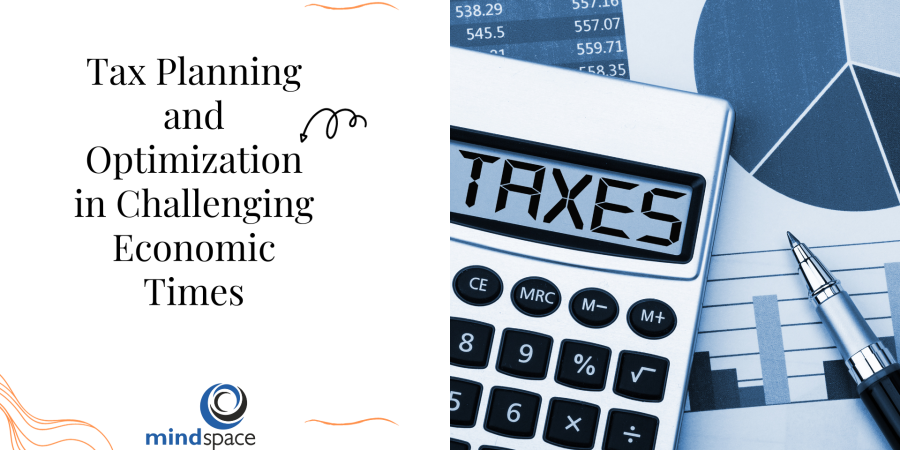Tax Planning and Optimization in Challenging Economic Times
Introduction
In the unpredictable seas of economic downturns, businesses find themselves steering through turbulent waters, desperately seeking stability and financial security. In such times, the role of tax planning and optimization becomes more critical than ever. As businesses grapple with uncertainties, strategic tax management emerges as a beacon, guiding them toward financial resilience and growth.
The Economic Storm: Navigating Choppy Waters
Economic downturns are inevitable, and businesses often face unforeseen challenges. The recent global economic shifts have underscored the need for proactive measures to safeguard financial health. Tax planning, traditionally viewed as a routine compliance task, transforms into a strategic tool to weather the storm.
1. Adaptability in Tax Regulations:
The fiscal landscape is ever-evolving, with tax regulations constantly changing. Amid economic challenges, tax planning involves staying agile and adapting to new regulations. Accounting firms play a pivotal role in keeping businesses informed about changes in tax laws, helping them navigate the complexities and capitalize on opportunities for optimization.
2. Strategic Tax Positioning:
In challenging economic times, strategic tax positioning is paramount. Accounting firms work closely with businesses to identify opportunities for tax optimization. This includes evaluating the most advantageous tax structures, maximizing deductions, and ensuring compliance with the latest tax codes. By strategically positioning themselves, businesses can minimize tax liabilities and enhance cash flow.
The Tax Planning Toolkit: Strategies for Optimization
- Cost Segregation Analysis:
One powerful tool in the tax planning arsenal is the cost segregation analysis. This involves identifying and reclassifying certain assets to accelerate depreciation deductions. Accounting firms collaborate with businesses to conduct a comprehensive analysis, uncovering opportunities to optimize tax benefits and improve cash flow.2. R&D Tax Credits:
Research and Development (R&D) tax credits serve as a lifeline for businesses investing in innovation. Accounting firms assist businesses in identifying eligible R&D activities and claiming the corresponding tax credits. This not only reduces tax liabilities but also encourages continued investment in research and development, fostering long-term growth.3. Loss Utilization Strategies:
Economic downturns often result in business losses. Accounting firms employ sophisticated loss utilization strategies, such as carrybacks and carryforwards, to offset current losses against past or future profits. This not only provides immediate relief but also sets the stage for a more resilient financial future.4. Strategic Business Restructuring:
Tax planning extends beyond compliance; it involves strategically restructuring businesses to optimize tax outcomes. Accounting firms collaborate with businesses to explore restructuring options that align with their financial goals. This may involve mergers, acquisitions, or divestitures, each tailored to enhance tax efficiency.The Role of Accounting Firms: Beyond Numbers and Compliance
1. Proactive Advisory Services:
In challenging economic times, accounting firms transform into proactive advisors. Rather than merely crunching numbers, they provide strategic insights, helping businesses make informed decisions that align with their tax and financial objectives. This proactive approach empowers businesses to navigate uncertainties with confidence.2. Scenario Planning and Risk Management:
Economic downturns bring heightened uncertainties, requiring businesses to engage in scenario planning and risk management. Accounting firms collaborate with businesses to model different financial scenarios, assess potential risks, and develop mitigation strategies. This foresight allows businesses to anticipate challenges and position themselves for resilience.3. Technology Integration:
The integration of technology is a game-changer in modern tax planning. Accounting firms leverage cutting-edge tools and software to streamline processes, enhance accuracy, and provide real-time insights. This not only improves efficiency but also allows businesses to adapt quickly to changing economic conditions.The Road Ahead: Building Financial Resilience
As businesses navigate the challenges of economic downturns, effective tax planning and optimization become the cornerstones of financial resilience. Accounting firms, evolving beyond traditional roles, emerge as strategic partners in this journey. By embracing proactive advisory services, leveraging advanced tax planning strategies, and integrating technology, businesses can not only survive but thrive in the face of adversity.In conclusion, tax planning and optimization are not mere financial maneuvers; they are strategic imperatives for businesses facing challenging economic times. As businesses and accounting firms join forces to navigate the choppy waters of economic uncertainty, the synergy between financial acumen and proactive advisory services becomes the key to building a resilient and prosperous future.


